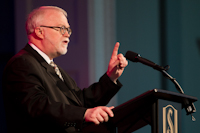Timothy George Challenges Southeastern to be Dedicated to the Call of God
January 19, 2017

 Timothy George, dean of Beeson Divinity School in Birmingham, Ala., spoke to Southeastern Baptist Theological Seminary (SEBTS) chapel attendees on Oct. 24 about William Tyndale’s singular dedication to translating the Bible into English.
Timothy George, dean of Beeson Divinity School in Birmingham, Ala., spoke to Southeastern Baptist Theological Seminary (SEBTS) chapel attendees on Oct. 24 about William Tyndale’s singular dedication to translating the Bible into English.
George has been the dean of Beeson Divinity School since its founding in 1988. He is also a professor of church history and doctrine and has authored over 20 books.
“He’s a real gift to the Church,” said Dr. Danny Akin, president of SEBTS. “He has an incredible mind, and one of the most winsome writing styles I have ever read. I have such a high regard for him.”
George’s teaching centered on the life of William Tyndale, an Englishman whose devotion to God’s Word and his calling to translate the Bible helped bring about the Protestant Reformation.
George asserted that the ability of the Bible to be translated is foundational to the Christian faith and sets it apart from other religions such as Judaism or Islam.
“The translatability of the Bible is inherent in the nature of Christianity itself,” George said. “It means that the power of God and the gospel is for everyone, everywhere. It means that the gospel has the power to permeate and transform any culture.”
In speaking about Tyndale’s life, George referenced Philippians 3:13 where Paul talks about his single-minded dedication to running his race.
“It has always been throughout the history of the Church that those whose lives have counted most, have lingered longest, are those who have willed one thing,” George said.
Like Paul, Tyndale focused on one thing: his call to translate the Bible, which he felt in his 20s though the Church considered it heresy. To complete this mission, Tyndale left England and lived as an outlaw in Europe in an attempt to avoid arrest.
“He remained a fugitive on the continent in order to accomplish the one thing he believed that God had called him to do,” George said. “All of his activities, his travels, were made to serve this overriding burden of his life.”
In 1525, Tyndale finished his translation of the New Testament. The following year 6,000 copies were printed and smuggled back to England and believers were eager to have their own copies. One boy read in the middle of the night so his father would not beat him and another man traded a wagonload of hay for the Epistle of James.
George emphasized the hunger these believers had for the Word, and challenged the audience to think about how they relate to the Bible.
“We have more Bibles than we know what to do with, but for many of us the Bible remains a closed, shut-up book,” George said. “William Tyndale’s legacy is an open Bible.”
“For Tyndale the Bible wasn’t simply a repository of revealed data about God and the world and ourselves,” George said. “For him the Bible was the locus of a personal encounter with the living God.”
This legacy is evident in the very translations we read today. The King James Version borrowed heavily from Tyndale’s work, and he translated many of the verses Christians treasure.
“The Word of God will stand forever,” George said. “Don’t forget that and don’t forget William Tyndale.”
To watch this sermon online, please click here.
To view photos from chapel, please click here.